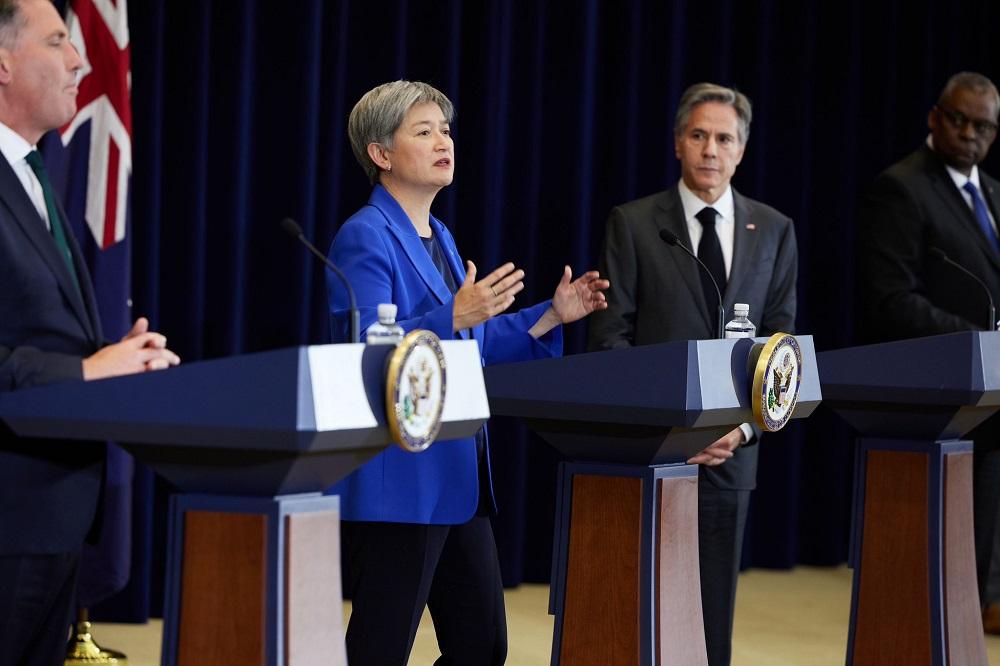The continuing search for balance in Australia’s Indo-Pacific policy
Posted By John McCarthy on December 20, 2022 @ 06:00

At the end of 2022, Australia’s Indo-Pacific policy is much better calibrated than in recent years. But the right balance between deterrence and engagement remains elusive. An inherent tension between the two concepts was apparent in the public outcomes of the separate talks earlier this month between Foreign Minister Penny Wong, Defence Minister Richard Marles and their American and Japanese counterparts.
After the AUSMIN talks in Washington, the comments to the media by the two defence principals were more outspoken about the dangers posed by China than those made by the two foreign policy principals.
While the AUSMIN communiqué [1] contained a lot more than defence-related material, media reporting inevitably focused more on the military aspects of the relationship with the US—particularly Australia’s acquisition of nuclear-powered submarines under the AUKUS pact and Japan’s inclusion in some trilateral activities in Australia—than on its other elements.
The best result in Washington did not emerge from the meeting itself, but from a speech [2] by Wong to the Carnegie Endowment think tank. She spoke forthrightly of the current strategic challenges in the region. But she also alluded to the lack of enthusiasm there for great-power competition and the aversion of its members to being asked to take sides. Key messages were about the importance of assisting regional countries to build their resilience and of their having agency in decisions that affected them.
The meetings in Japan fleshed out [3] the agreements reached by prime ministers Anthony Albanese and Fumio Kishida in their declaration on security cooperation [4] in October. Importantly, there were extensive references in the communiqué to cooperation in the Pacific. There was no reference to Japan being associated with some of the technology-transfer aspects of AUKUS as had been suggested in Washington. The Japanese like to line up their ducks before making major statements.
These meetings in Washington and Tokyo took place after what was widely acknowledged as a successful and well-modulated round of meetings [5] in November by Albanese at global and regional summits in Southeast Asia, including his meeting with Chinese President Xi Jinping, which restored an element of stability to our dealings with China.
However, the prominence of the deterrence aspects of our policies will inevitably remain pronounced as the defence strategic review [6] headed by former defence and foreign minister Stephen Smith and former defence chief Angus Houston unfolds and while the submarine question looms large (one assumes for quite a while). A government cannot commit large sums of money to defence without copious comment as to why it is needed.
And there will be some overflow from the United States as the presidential electoral season with all its accompanying hype gets underway.
This emphasis on deterrence—and the jagged rhetoric that can accompany it—overshadows the importance of engagement and raises two major issues.
The first is obvious. We need a bit more emphasis on engagement with China and bit less on deterrence if we are to have a less contentious relationship with that country (accepting the need for Chinese reciprocity). Our own economic interests and indeed security interests are at stake here. Moreover, if we want the Chinese to conduct themselves less forcefully in the region, we at least must be able to readily talk to them.
Second, we have already lifted the level and quality of our engagement with Southeast Asia. But we need to think harder about where American, Australian and, to a lesser extent, Japanese deterrence policies leave Southeast Asia—the most important area of Sino-American competition.
At least four significant Southeast Asian nations—Indonesia, Malaysia and, more privately, Thailand and Singapore—don’t much like AUKUS and are lukewarm on the Quad.
But this is not the predominant issue for them. The bigger worry for Southeast Asia is that American approaches to Taiwan—with which we and Japan are associated—could provoke hostilities with China.
For the most part, the Southeast Asians don’t see a Chinese attack on Taiwan as likely, at least in the near or medium term. However, this view would change rapidly if the talk in some circles in America of abandonment of the policy of strategic ambiguity (avoiding a categorical commitment to defend Taiwan) or even forgoing the one-China policy, became a reality.
There is also concern in much of Southeast Asia—and indeed elsewhere—about American thinking on supply-chain decoupling and ‘friend-shoring’ or ‘ally-shoring’ (encouraging companies to shift manufacturing away from authoritarian states, mainly China, and towards friends and allies).
There are dangers here. Do we want to have a split in Southeast Asia between those whom the Americans favour and those whom they don’t (accepting a need to maintain pressure on Myanmar)? What do we do about friends such as Vietnam, or even India, whose internal policies many would disagree with?
As a middle power, we are not a prime mover in the region. But we have influence. Over the next year or so, we will be better able to exercise this influence if the importance of balance becomes a more significant factor in our thinking. Deterrence is all very well, but it should very clearly be just one element in a wider external strategy, not the strategy itself.
Article printed from The Strategist: https://aspistrategist.ru
URL to article: /the-continuing-search-for-balance-in-australias-indo-pacific-policy/
URLs in this post:
[1] AUSMIN communiqué: https://www.state.gov/joint-statement-on-australia-u-s-ministerial-consultations-ausmin-2022/
[2] speech: https://www.foreignminister.gov.au/minister/penny-wong/speech/speech-carnegie-endowment-international-peace
[3] fleshed out: https://www.foreignminister.gov.au/minister/penny-wong/media-release/tenth-japan-australia-22-foreign-and-defence-ministerial-consultations
[4] declaration on security cooperation: https://www.dfat.gov.au/countries/japan/australia-japan-joint-declaration-security-cooperation
[5] round of meetings: https://www.afr.com/politics/federal/pm-wraps-up-summit-sweep-with-global-standing-restored-20221119-p5bzlp
[6] defence strategic review: https://www.minister.defence.gov.au/statements/2022-08-03/joint-statement-defence-strategic-review
Click here to print.